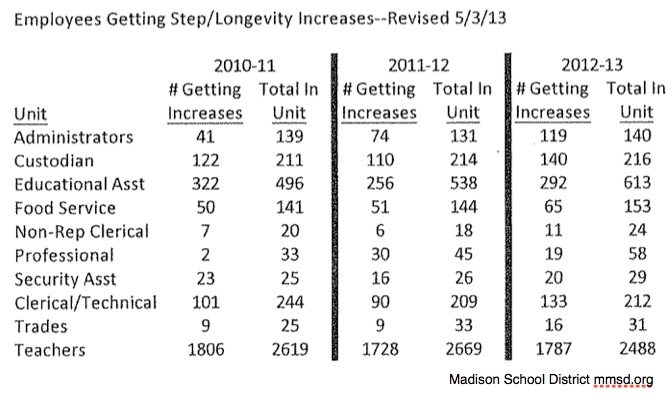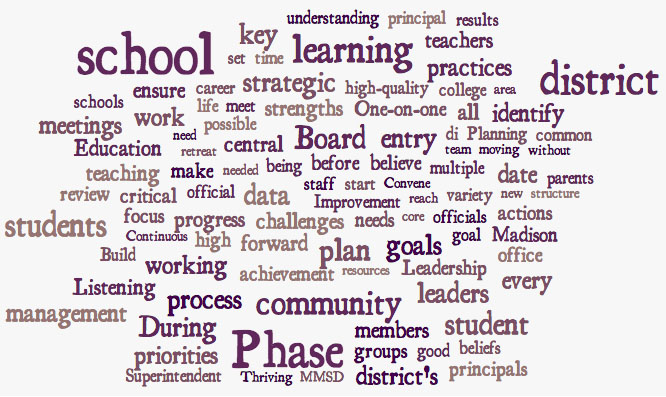Amy Barrilleaux:
After paying an Iowa-based headhunting firm $30,975 to develop a candidate profile and launch a three-month nationwide recruitment effort, and after screening 65 applications, the Madison school board has narrowed its superintendent search down to two finalists. Dr. Jenifer Cheatham is chief of instruction for Chicago Public Schools, and Dr. Walter Milton, Jr., is superintendent of Springfield Public Schools in Illinois.
Parents and community members will get a chance to meet both finalists at a forum at Monona Terrace starting at 5:45 p.m. Thursday night. But despite the exhaustive and expensive search, the finalists aren’t without flaws.
Cheatham was appointed to her current post as chief of instruction in June of 2011 by Chicago Public Schools CEO Jean-Claude Brizard, who has since resigned. According to her Chicago district bio, Cheatham’s focus is improving urban school districts by “developing instructional alignment and coherence at every level of a school system aimed at achieving breakthrough results in student learning.” Cheatham received a master’s and doctorate in education from Harvard and began her career as an 8th grade English teacher. But she found herself in a harsh spotlight as Chicago Mayor Rahm Emanuel and district officials pushed for a contentious 7.5 hour school day last year, which became one of many big issues that led to the Chicago teachers strike in September.
“It was handled horribly in terms of how it was rolled out,” says Chicago attorney Matt Farmer, who also blogs about Chicago school issues for The Huffington Post.
Farmer says pressure was mounting last spring for the district to explain how the longer day would work and how it would be paid for. Cheatham was sent to a community meeting he attended on the city’s south side to explain the district’s position.
Some of candidate Walter Milton Jr.’s history a surprise to School Board president
Madison School Board president James Howard said Monday he wasn’t aware of some of the controversial aspects of Walter Milton Jr.’s history until after the board named him a finalist to be Madison’s next superintendent.
Prior to becoming superintendent in Springfield, Ill., Milton was criticized for hiring without a background check a colleague who had been convicted of child molestation in Georgia. The colleague, Julius B. Anthony, was forced to resign from a $110,000 job in Flint, Mich., after a background check uncovered the case, according to the Springfield State Journal-Register.
Milton and Anthony were former business partners and worked together in Fallsburg, N.Y., where Milton was superintendent before moving to Flint, according to news reports.
Steven Verburg: Jennifer Cheatham fought for big changes in Chicago schools:
“Jennifer Cheatham will be the third person in the last two years from our administration who I’ve been a reference for who has taken over a fairly significant school district,” Vitale said. “Chicago is a pretty good breeding place for leaders.”
Matthew DeFour:
A Springfield School District spokesman said Milton is declining interviews until a community forum in Madison on Thursday.
Prior to Fallsburg, Milton was a teacher and principal in his hometown of Rochester, N.Y. He received a bachelor’s degree in African history and African-American studies from Albany State University, a master’s degree in education from the State University of New York College at Brockport and a Ph.D. in education from the University of Buffalo.
Milton’s contract in Springfield expires at the end of the 2013-14 school year. His current salary is $220,000 plus about $71,000 in benefits.
School Board members want a superintendent with vision, passion and a thick hide
Madison School Board member Marj Passman says she was looking for superintendent candidates who have had experience working in contentious communities. “That’s important, considering what we’ve gone through here,” she told me Monday.
And what Madison schools are going through now.
The Madison Metropolitan School District had scarcely released the names of the two finalist candidates — Jennifer Cheatham, a top administrator in the Chicago Public School System and Walter Milton Jr., superintendent of the schools in Springfield, Ill. — before the online background checks began and comments questioning the competency of the candidates were posted. So the new Madison superintendent has to be someone who can stand up to public scrutiny, Passman reasoned.
And the issues that provoked the combative debate of the last couple of years — a race-based achievement gap and charter school proposal meant to address it that proved so divisive that former Superintendent Dan Nerad left the district — remain unresolved.
So, Passman figured, any new superintendent would need experience working with diverse student populations. Both Cheatham and Milton fit that bill, Passman says.
What are the odds that the traditional governance approach will substantively address Madison’s number one, long term challenge? Reading….
Much more on the latest Madison Superintendent search, here along with a history of Madison Superintendent experiences, here.


